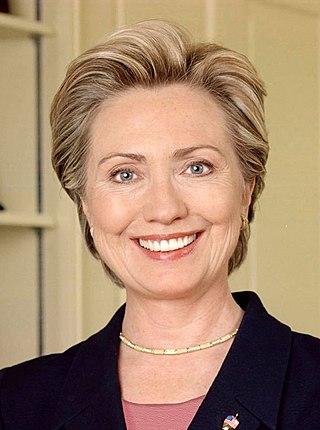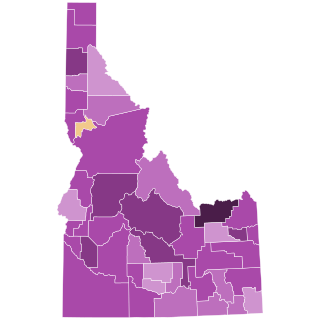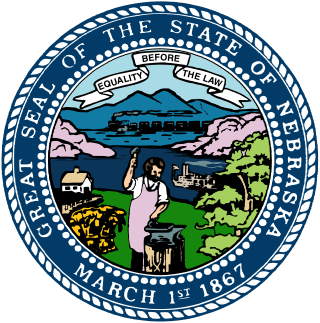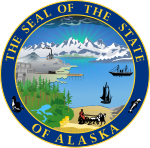
Each of the 50 U.S. states, the District of Columbia, and territories of the United States holds either primary elections or caucuses to help nominate individual candidates for president of the United States. This process is designed to choose the candidates that will represent their political parties in the general election.
In American politics, a superdelegate is a delegate to a presidential nominating convention who is seated automatically.

From January 3 to June 3, 2008, voters of the Democratic Party chose their nominee for president in the 2008 United States presidential election. Senator Barack Obama of Illinois was selected as the nominee, becoming the first African American to secure the presidential nomination of any major political party in the United States. However, due to a close race between Obama and Senator Hillary Clinton of New York, the contest remained competitive for longer than expected; neither candidate received enough pledged delegates from state primaries and caucuses to achieve a majority, without endorsements from unpledged delegates (superdelegates).

The 2008 Iowa Democratic presidential caucus occurred on January 3, and was the state caucuses of the Iowa Democratic Party. It was the first election for the Democrats of the 2008 presidential election. Also referred to as "the First in the Nation Caucus," it was the first election of the primary season on both the Democratic and Republican sides. Of the eight major Democratic presidential candidates, then-U.S. Senator Barack Obama of Illinois received the most votes and was ultimately declared the winner of the Iowa Democratic Caucus of 2008, making him the first African American to win the caucus and the first African American to win a primary state since Jesse Jackson in 1988. Former U.S. Senator John Edwards of North Carolina came in second place and then-U.S. Senator Hillary Clinton of New York finished third, though Clinton received more delegates than Edwards. Campaigning had begun as early as two years before the event.
The results of the 2008 Democratic Party presidential primaries are the detailed outcomes of a series of contests by which members of the United States Democratic Party chose their candidate for the 2008 U.S. presidential election. The contests are held in each of the fifty U.S. states, as well as the District of Columbia, Puerto Rico, American Samoa, Guam, the U.S. Virgin Islands, and Democrats Abroad. The Northern Mariana Islands was the lone U.S. state or territory which did not have a primary or caucus election in 2008. The outcomes include totals of delegates selected as well as popular votes.

The 2008 United States presidential election in Iowa took place on November 4, 2008, as part of the 2008 United States presidential election. Voters chose seven representatives, or electors to the Electoral College, who voted for president and vice president.

The 2008 Nevada Democratic presidential caucuses took place on January 19, 2008 after having been moved from a later date by the Nevada Democratic Party. The Nevada Democratic Caucus was considered important in determining the eventual party nominee, as many described it as the "Bellwether of the West" seeing as how it is the first Western state to vote in the Democratic Presidential Primary season.

The 2008 Florida Democratic presidential primary took place on January 29, 2008. Originally, the state had 185 delegates up for grabs that were to be awarded in the following way: 121 delegates were to be awarded based on the winner in each of Florida's 25 congressional districts while an additional 64 delegates were to be awarded to the statewide winner. Twenty-five unpledged delegates, known as superdelegates, were initially able to cast their votes at the Democratic National Convention.

The 2008 Minnesota Democratic presidential caucuses took place on Super Tuesday, February 5, 2008 with 78 delegates at stake. The winner in each of Minnesota's eight congressional districts was awarded all of that district's delegates, totaling 47. Another 25 delegates were awarded to the statewide winner, Barack Obama. The 72 delegates represented Minnesota at the Democratic National Convention in Denver, Colorado. Sixteen other unpledged delegates, known as superdelegates, also attended the convention and cast their votes as well.

The 2008 Colorado Democratic presidential caucuses took place on Super Tuesday, February 5, 2008. As he did in every other state that held a caucus rather than a primary, Barack Obama won the caucus by a wide, two-to-one margin over Hillary Clinton.

The 2008 Kansas Democratic presidential caucuses took held on Super Tuesday, February 5, 2008, with 21 delegates at stake. The remaining 11 delegates were selected at the Kansas Democratic Party District Conventions on April 12. The state, and a majority of its delegates, were won by Barack Obama.

The 2008 American Samoa Democratic presidential caucuses took place on February 5, 2008, also known as Super Tuesday. Caucusing began at 11:00 am local time. The early time ensured that results would be reported that evening in the mainland United States. Hillary Clinton won the caucus, the smallest of Super Tuesday's nominating contests.

The 2008 Idaho Democratic presidential caucuses were held on Super Tuesday, February 5, 2008, with 18 national delegates at stake. For the first time, caucuses were held in all 44 counties, all of them open caucuses organized at the county level rather than the precinct level.

The 2008 Nebraska Democratic presidential caucuses took place on February 9, 2008, where 24 of the state's 31 convention delegates were chosen. Like he did throughout many other states that held caucuses instead of primaries, Barack Obama won the Nebraska Democratic Caucus by more than a two-to-one margin of victory over Hillary Clinton. On May 13, 2008, the state also held a non-binding primary election which Obama also won but the margin of victory was considerably smaller.

The 2008 Hawaii Democratic presidential caucuses took place on February 19, 2008, with 20 pledged delegates at stake. The winner in each of Hawaii's two congressional districts was awarded all of that district's delegates, totaling 13. Another seven delegates were awarded to both candidates at the Hawaii Democratic Party State Convention on May 23–25, 2008. These 20 delegates represented Hawaii at the Democratic National Convention in Denver, Colorado. Nine other unpledged delegates, known as superdelegates, also attended the convention and cast their votes as well.

The 2008 Vermont Democratic presidential primary was an open primary that took place on March 4, 2008. Barack Obama won the primary, his only decisive win among the four March 4 contests. The primary determined the 15 pledged delegates that represented Vermont at the 2008 Democratic National Convention. The delegates were awarded to the candidates, Obama and Hillary Clinton, on a proportional basis. Vermont also sent 8 unpledged "superdelegates", to the convention not bound by the results of the primary.

The 2008 Texas Democratic presidential primary and caucuses were a series of events to determine the delegates that the Texas Democratic Party sent to the 2008 Democratic National Convention. Delegates were selected using results from two sources: the Texas Presidential Primary held on March 4 by the Secretary of State of Texas's office, and a series of caucus events held between March 4 and June 7 by the Texas Democratic Party. The indecisive results of Super Tuesday, and the fact that Texas had the largest number of delegates among the states remaining on the Democratic primary calendar, resulted in the Texas primary receiving significant attention from both the Hillary Clinton and Barack Obama campaigns.

Presidential primaries and caucuses were organized by the Democratic Party to select the 4,051 delegates to the 2016 Democratic National Convention held July 25–28 and determine the nominee for President in the 2016 United States presidential election. The elections took place within all fifty U.S. states, the District of Columbia, five U.S. territories, and Democrats Abroad and occurred between February 1 and June 14, 2016. Between 2008 and 2024, this was the only Democratic Party primary in which the nominee had never been nor had ever become President of the United States. This was the first Democratic primary to nominate a woman for President.
Democrats Abroad holds a primary awarding delegates to the Democratic National Convention to represent expatriate voters. This primary is conducted as part of the Democratic Party's presidential primaries. In some earlier elections, in place of a primary, a caucus system was used by Democrats Abroad to determine their convention delegations.
















